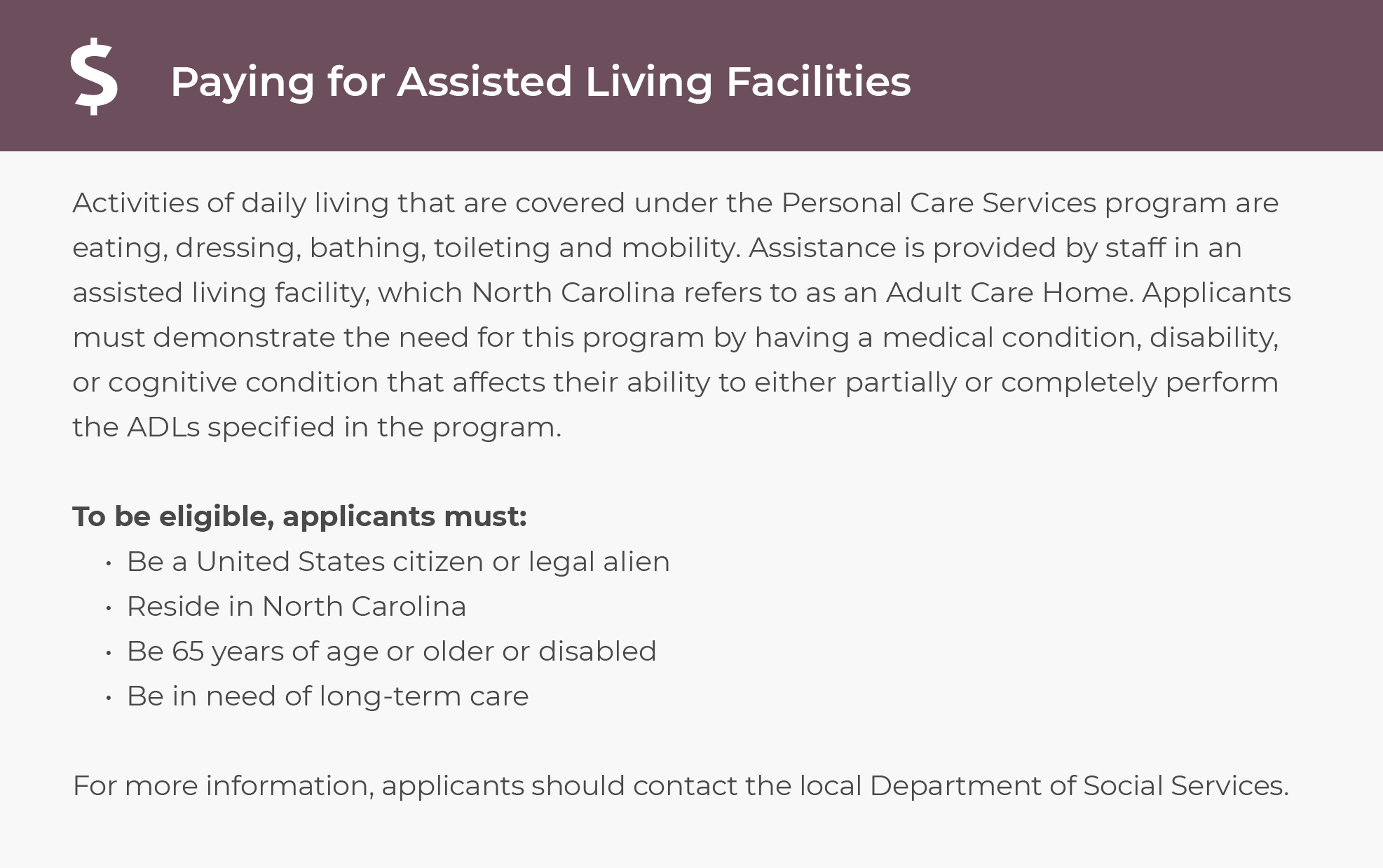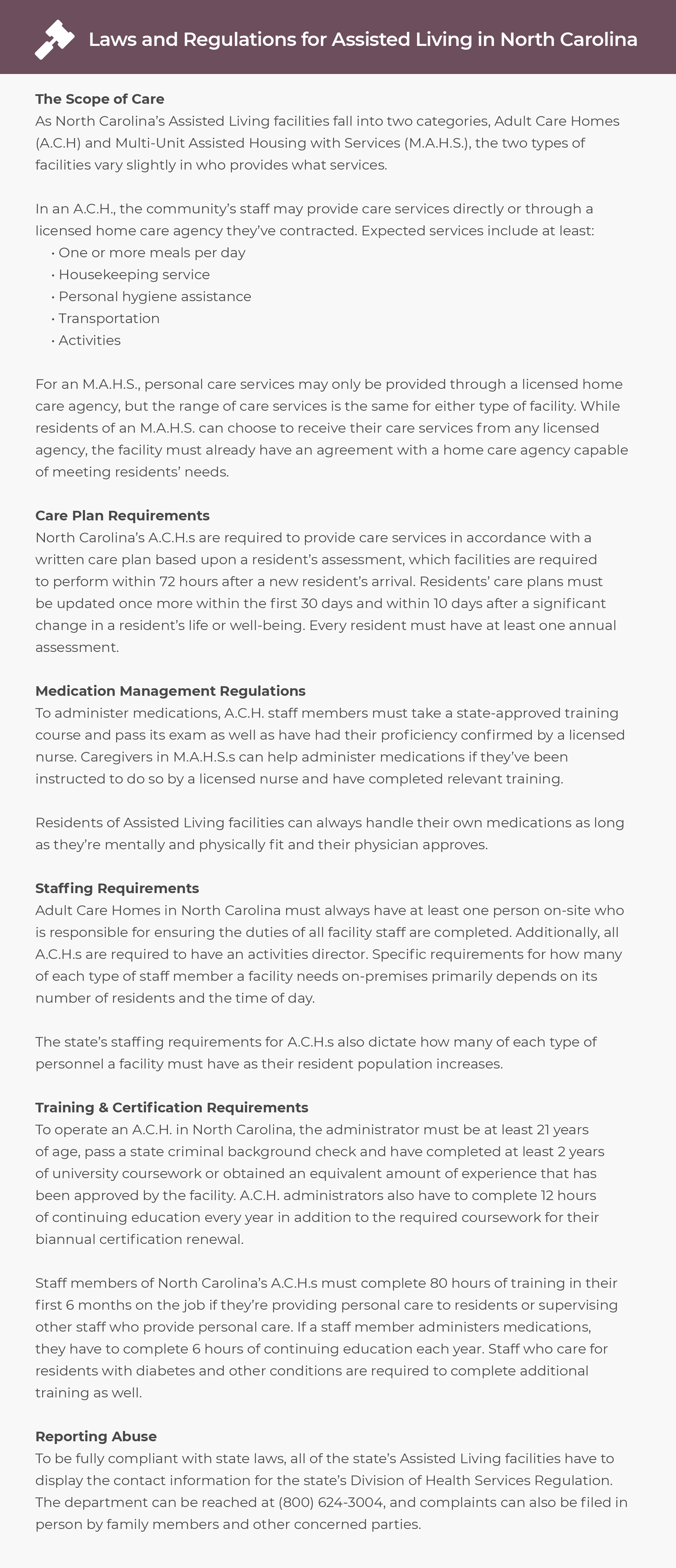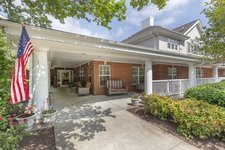Chapel Hill, North Carolina, is a vibrant small city home to 64,051 residents. Seniors aged 65 and older make up approximately 11.2% of Chapel Hill. Chapel Hill has a humid subtropical climate, with hot summers and wet and cold winters. The temperature averages between 32°F to 88°F, ideal for seniors who enjoy spending time outdoors year-round. Chapel Hill is also home to the University of North Carolina at Chapel Hill. There are many great attractions, including restaurants, museums, live music venues and shopping. Seniors can enjoy the botanical garden at Coker Arboretum or explore the Ackland Art Museum’s permanent collection. Sports fans can cheer on the world-renowned North Carolina Tar Heels basketball team, and classical music fans can enjoy a live concert at Memorial Hall.
Assisted living care makes sense for older adults who need basic-to-moderate support with the activities of daily living, such as getting dressed, making meals and taking medications. Data in the Genworth 2021 Cost of Care Survey shows that Chapel Hill’s average monthly cost for assisted living care is $4,800, making the area somewhat more expensive than state and national averages.
In this guide, we’ll look into how prices for assisted living care in various North Carolina cities stack up against one another. We’ll also examine some senior-support resources that can help ease your retirement in Chapel Hill.
Hundreds of thousands of American seniors utilize assisted living, a figure that is only growing. For these seniors, assisted living combines residential housing,assistance in daily activities, and some healthcare. These communities also strive to provide an atmosphere that is comfortable and engaging for their residents… Read More >
COVID-19 restrictions and rules for Assisted Living Facilities are typically set by the state – to see the rules in your state, you can read our guide to Assisted Living in North Carolina. Keep in mind that there may be other policies that communities put in place to protect their residents, so you should contact your local community for more information. Additionally, you can contact your local Area Agency on Aging to learn more – find contact information here.
Chapel Hill seniors see an average price of $4,800 per month for assisted living care.
Across the state of North Carolina specifically, the average price of assisted living care is nearly $800 cheaper than in Chapel Hill. The average price nationally is $300 lower than Chapel Hill’s cost.
North Carolina’s capital, Raleigh, happens to report its highest average monthly price for assisted living care, at over $500 more than Chapel Hill. Wilmington is similarly expensive at $5,254, and Asheville is also more expensive than Chapel Hill at $4,998 monthly. Charlotte, the state’s largest city by population, is $400 less expensive than Chapel Hill at $4,440 a month. Far lower prices can be found in the state’s smaller cities: in Fayetteville, the monthly average is $3,000, and in Goldsboro, seniors pay over $2,000 less than in Chapel Hill.
Note: Data for Chapel Hill was unavailable, so data for the nearest city, Durham, was used instead.

Since not everyone can afford to pay for assisted living out-of-pocket, it’s important to find alternative methods to help make assisted living more affordable. Some of these options include:
For more information about your options for making assisted living more affordable, visit our guide to Assisted Living in North Carolina.
| Contact | Description | |
| Orange County Council of Aging | (919) 968-2070 | Serving as a local resource for seniors and their caregivers, The Orange County Council of Aging provides integrated aging services through a network of senior centers. Older adults have access to a wide range of programs to support their social, mental and day-to-day needs at spaces such as the Seymour Center in Chapel Hill. |
| Carolina Veterans Resource Center | (919) 962-9640 | Veterans of the armed forces and their families can receive assistance with claiming benefits as well as general administrative service from the Carolina Veterans Resource Center. Veteran Services Officers can also provide legal assistance and support with the Aid and Attendance Benefit, which offers seniors financial assistance to cover assisted living costs. |
| The North Carolina Association on Aging (NCAOA) | (Contact form via website) | The NCAOA advocates for quality programs designed to empower older adults to live as independently as possible. The organization also offers on-going educational opportunities, including the annual North Carolina State Aging Conference. |
| North Carolina Division on Aging and Adult Services | (919) 855-3400 | Advocating for older adults and those who care for them is the mission of the DAAS. The DAAS also provides seniors with programs designed to support aging with dignity, including the long-term care ombudsman program, which helps to advocate for elderly North Carolina residents living in long-term care facilities. |
| Long Term Care Ombudsman (Advocacy for Residents in Long Term Care Facilities) | (800) 662-7030 | Organized by the NC Department of Health and Human Services, the Long-Term care Ombudsman program consists of 16 regional offices throughout North Carolina. Services include explaining resident’s rights in long-term care facilities, guidance on Medicaid and Medicare programs and educational initiatives regarding care planning, activities and new laws. |
Assisted Living Facilities in the Chapel Hill area are required to follow a set of rules and regulations that are determined at the state level. For an overview of those rules and regulations, see the information below. For more specific information, talk with your local community or Area Agency on Aging.










